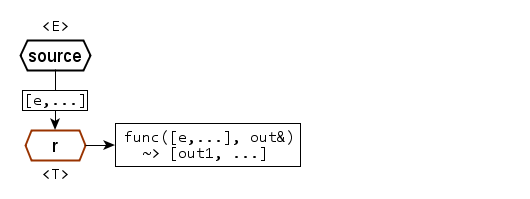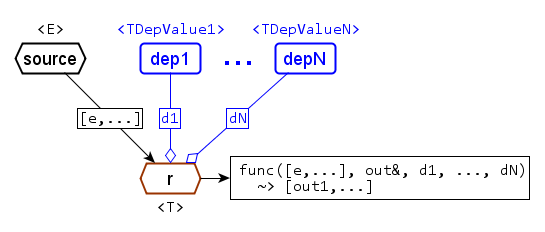Process function
Syntax
// (1)
template
<
typename T,
typename D,
typename E,
typename F
>
Events<D,T> Process(const Events<D,E>& source, F&& func);
// (2)
template
<
typename T,
typename D,
typename E,
typename F,
typename ... TDepValues
>
Events<D,T> Process(const Events<D,E>& source,
const SignalPack<D,TDepValues...>& depPack, F&& func);
Semantics
(1) func(range, out) is called with all events range from source in current turn, under the condition that the number of events is greater zero.
New events are emitted through *out = e.
(2) Similar to (1), but the synchronized values of signals in depPack are passed to func as additional arguments.
Note: Changes of signals in depPack do not trigger an update - only received events do.
The signature of func should be equivalent to:
- (1)
void func(EventRange<E> range, EventEmitter<T> out)
- (2)
void func(EventRange<E> range, EventEmitter<T> out, const TDepValues& ...)
The type of outgoing events T has to be specified explicitly, i.e. Process<T>(src, func).
EventRange is an adapter that exposes random access input iterators to begin and end of the source event container.
EventEmitter is a std::back_insert_iterator of the output event container.
Graph
(1)

(2)

 Hold
Hold Monitor
Monitor Iterate
Iterate Snapshot
Snapshot Pulse
Pulse Changed
Changed ChangedTo
ChangedTo WeightHint
WeightHint Continuation
Continuation TransactionStatus
TransactionStatus DoTransaction
DoTransaction AsyncTransaction
AsyncTransaction MakeContinuation
MakeContinuation REACTIVE_DOMAIN
REACTIVE_DOMAIN USING_REACTIVE_DOMAIN
USING_REACTIVE_DOMAIN Token
Token Events
Events EventSource
EventSource TempEvents
TempEvents EventRange
EventRange MakeEventSource
MakeEventSource Merge
Merge Filter
Filter Transform
Transform Process
Process Join
Join Flatten
Flatten Tokenize
Tokenize ObserverAction
ObserverAction Observer
Observer ScopedObserver
ScopedObserver Observe
Observe Reactor
Reactor MakeReactor
MakeReactor Signal
Signal VarSignal
VarSignal TempSignal
TempSignal SignalPack
SignalPack MakeVar
MakeVar MakeSignal
MakeSignal Flatten
Flatten With
With REACTIVE_PTR
REACTIVE_PTR REACTIVE_REF
REACTIVE_REF
